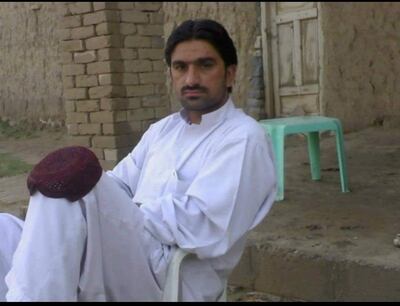Follow the latest updates on Afghanistan here
An Afghan whose brother was killed by the Taliban has said he watched in horror as the militants stormed through his home country and captured the capital.
Ibrahim Mohammad Saeed’s brother Fazil was shot dead by the Taliban in 2012 in the family's home town of Khost.
Fazil became a target because he worked as a driver for the UN Office for Project Services, which organised and oversaw impartial elections across Afghanistan.
The south-eastern city of Khost had been a hotbed of insurgency, even a decade after the US invasion in 2001.
Mr Saeed's mother, one of his brothers and his youngest sister fled to Peshawar in Pakistan.
Two of his sisters live with their husbands in Afghanistan, while his father lives with him in the UAE.
Mr Saeed, who has worked as a salesman in Abu Dhabi since 2008, said the insurgents were monsters and that "everyone is scared and worried".
“They killed my brother for working with the United Nations as a driver. He was sitting with my uncle in his shop and they came and shot him. They are ruthless," he said.
Mr Saeed worked as an English teacher in Khost between 2006 and 2008.
The Taliban were toppled in 2001, but the group retained an influence in Khost and he was told he should not teach children foreign languages.
A school in his district was shot at by Taliban fighters and he eventually accepted the pleas of his father to flee the country for the safety of the Emirates.
But long after Mr Saeed left Afghanistan, he received messages from fighters in the country.

He was even sent threats after sharing a video on social media that showed Pope Francis during his visit to Abu Dhabi in 2019 – an important moment for interfaith relations and tolerance.
“I haven’t been to my country in years because they have threatened me to kill me," Mr Saeed said.
"I was receiving calls from them because I shared a video of Pope Francis’ speech. They were angry because they think I was promoting another religion, but the message was more about tolerance and being accepting of others.”
When the Taliban controlled Afghanistan between 1996 and 2001, they imposed restrictions on women leaving their homes, banned music and dancing, ordered men to grow beards and denied girls access to education.
The insurgents have seized power once more after a nationwide offensive, but have said citizens “should not worry” and that girls would be able to go to school this time.
But Afghans and human rights groups are not convinced.
“They are not trustworthy. We can already see them painting over posters with faces, telling women to stay at home. No one is safe around them,” Mr Saeed said.
“Our country has made a lot of progress in the past two decades and now we would start going in the opposite direction because of the Taliban.”





































































